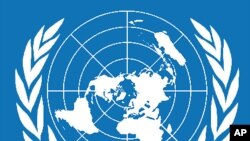The United Nations will seek an additional $73 million in humanitarian aid for Zimbabwe beyond the $415 million initially requested in December of last year to meet food assistance and other needs, officials said.
Speaking in Harare on Tuesday at the launch of the 2011 Mid-Term Consolidated Appeal Process, UN Humanitarian Coordinator Alain Noudehou said donors have pledged $142 million or 34 percent of the initial target.
Aid agencies said food production fell short in six Zimbabwean provinces due to a long dry spell. The country has been partially dependent on food aid for years, at times due to drought but also due to the blow to agriculture from its land reform program.
Information Officer Matilda Moyo of the UN Office for the Coordination of Humanitarian Affairs told VOA Studio 7 reporter Jonga Kandemiiri that the poor response by donors reflects competing demands in other areas, especially famine-hit Somalia.
Chief Executive Officer Cephas Zinhumwe of the National Association of Non-Governmental Organizations said the government waited too long to inform the United Nations and donors that food production would fall short of needs.
Meanwhile, outgoing Commercial Farmers Union President Deon Theron said Zimbabwe has lost $12 billion in agricultural output since land reform began in 2000.
Speaking to his group on the weekend, Theron said less than 1 percent of the country’s 1.8 million farm workers have received farms under the controversial initiative.
Theron told reporter Violet Gonda that land records show most farm properties have gone to top politicians, senior members of security forces, judges and relatives of senior officials of President Robert Mugabe's former ruling ZANU-PF party.
He said Mr. Mugabe and his immediate family own 39 farms.
Theron said that there was no genuine empowerment or farmer autonomy, there was no security of tenure and there was no collateral value attached to the land. "It is a dead asset, which cannot drive its own development,” he added.
“If the aim of land reform was to evict whites and replace them with blacks, then it can be deemed a success," Theron continued. "However, if the aim was to benefit the majority and not only a chosen few, then it has been a failure.”
Political analyst John Makumbe of the University of Zimbabwe said the report by the CFU shows why a land audit is badly needed in Zimbabwe.
No response to Theron's statements was immediately available from ZANU-PF. President Mugabe and his political allies have blamed Western sanctions, which they say were imposed in retribution for land reform, for the country's economic problems.





